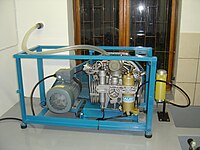
Photo from wikipedia
This work investigates the effects of pressure pulsations on reciprocating natural gas compressor performance thermodynamically. A nonlinear hybrid numerical model is thus developed to consider the interaction between the compressor… Click to show full abstract
This work investigates the effects of pressure pulsations on reciprocating natural gas compressor performance thermodynamically. A nonlinear hybrid numerical model is thus developed to consider the interaction between the compressor and the pipeline system. The suction chamber, compressor cylinder and discharge chamber are modelled integrally based on the first law of thermodynamics and mass balance, and the pipeline flow is described by using the gas dynamic model. Methane is considered as the working fluid and its properties are computed based on ideal and real gas assumptions. For the real gas model, the methane properties are obtained by means of calling the NIST REFPROP database. The validity of numerical results is confirmed by previous experimental values. Results from the examinations of pressure pulsation influence demonstrate that discharge resonance requires more specific work than suction resonance in the same harmonic; in the suction system, the first harmonic response reduces the mass flow rate but significantly increases specific work, and the second harmonic response has a strong supercharging effect but the specific work is increased slightly; in the discharge system, the mass flow rate is changed little by pressure pulsations, but the indicated power and specific work are increased significantly; for the real gas model, the in-cylinder temperature during the compression and discharge phases, mass flow rate and indicated power are higher than those for the ideal gas model, whereas the specific work is less for the real gas model than for the ideal gas model.
Journal Title: Applied Sciences
Year Published: 2019
Link to full text (if available)
Share on Social Media: Sign Up to like & get
recommendations!